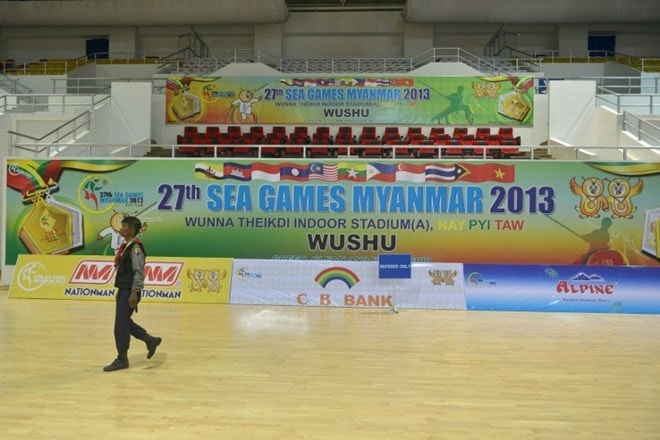SEA Games 27: Host Myanmar still has many worries
Empty seats and security concerns are major concerns as Myanmar gears up for the 27th Southeast Asian Games (SEA Games), the biggest sporting event ever held in the country.
Thousands of athletes, officials, fans and media will gather for the SEA Games, which are moving towards an opening ceremony on December 11. Two years after the end of military rule and the lifting of Western sanctions, Myanmar is hoping to shine on the international stage during the 22-day event.
 |
| SEA Games Central Gymnasium in Nay Pyi Taw on November 30 (Source: AFP) |
But officials also want to avoid empty stadiums in the new capital, Nay Pyi Taw, as well as security threats from numerous insurgent groups at home.
Logistical problems could also arise due to a lack of hotel rooms to accommodate some 6,000 athletes and 3,000 reporters and officials, not to mention fans.
Although the scale of the SEA Games cannot be compared to the 2008 Beijing Olympics, it has a similar significance, as it is an event for Myanmar to affirm its image and prestige. Myanmar, a founding member of this sporting event, last hosted the Games in 1969.
So now Myanmar is keen to put on an impressive show against its neighbours at the biennial regional sports event.
As preparations continued in the new capital Nay Pyi Taw, Vice President Nyan Tun called on the host athletes to “strive for a golden age of Myanmar sports.” He said the main goal was to “raise the country’s prestige and go down in history as national sports heroes,” according to an official press release.
Myanmar is one of Southeast Asia’s poorest countries, with a third of its population living in poverty, so expectations are limited. But Myanmar will hope this edition will improve on the previous edition in Indonesia in 2011, which was marred by corruption, delays and ended with a deadly riot during the men’s final.
One of the top concerns will be unrest from ethnic minorities after bombings and clashes broke out in many parts of the country in recent weeks.
“Thousands of fans and officials will be coming,” a senior police officer told AFP. “Although we have tried our best to ensure security with the necessary personnel, I am still a little worried.”
Organizers have also tried to fill the newly built venues in Naypyidaw by offering free tickets for all events except football. But demand is low in this sparsely populated city, where avenues are often deserted, and empty stadiums are inevitable.
Additionally, while host officials insist preparations are complete, there are concerns about how Myanmar will accommodate all the guests. “There are not enough hotel rooms because so many foreigners will come,” an unnamed government official told AFP. “Tens of thousands of people are attending the event. Hopefully everything will go smoothly. Cooperation between ministries is very weak.”
Nay Pyi Taw will host most of the events, while the former capital Yangon, 300km to the south, will host men's football, bodybuilding, weightlifting and kempo, a traditional martial art.
Competitions will take place in a wide range of events, from core Olympic sports such as swimming and athletics to local folk games unique to Southeast Asia, even Myanmar.
Chinlone, a Myanmar sport in which athletes control a small ball with their feet, will be the opening event, as will the traditional Indonesian martial art, pencak silat. A total of 460 medals will be awarded, including 11 for petanque, a legacy of French colonial rule in Southeast Asia.
It is expected that 30,000 people will attend the opening ceremony, including heads of state from several countries, at Wunna Theikdi Stadium in Nay Pyi Taw on December 11./.
According to VNA






